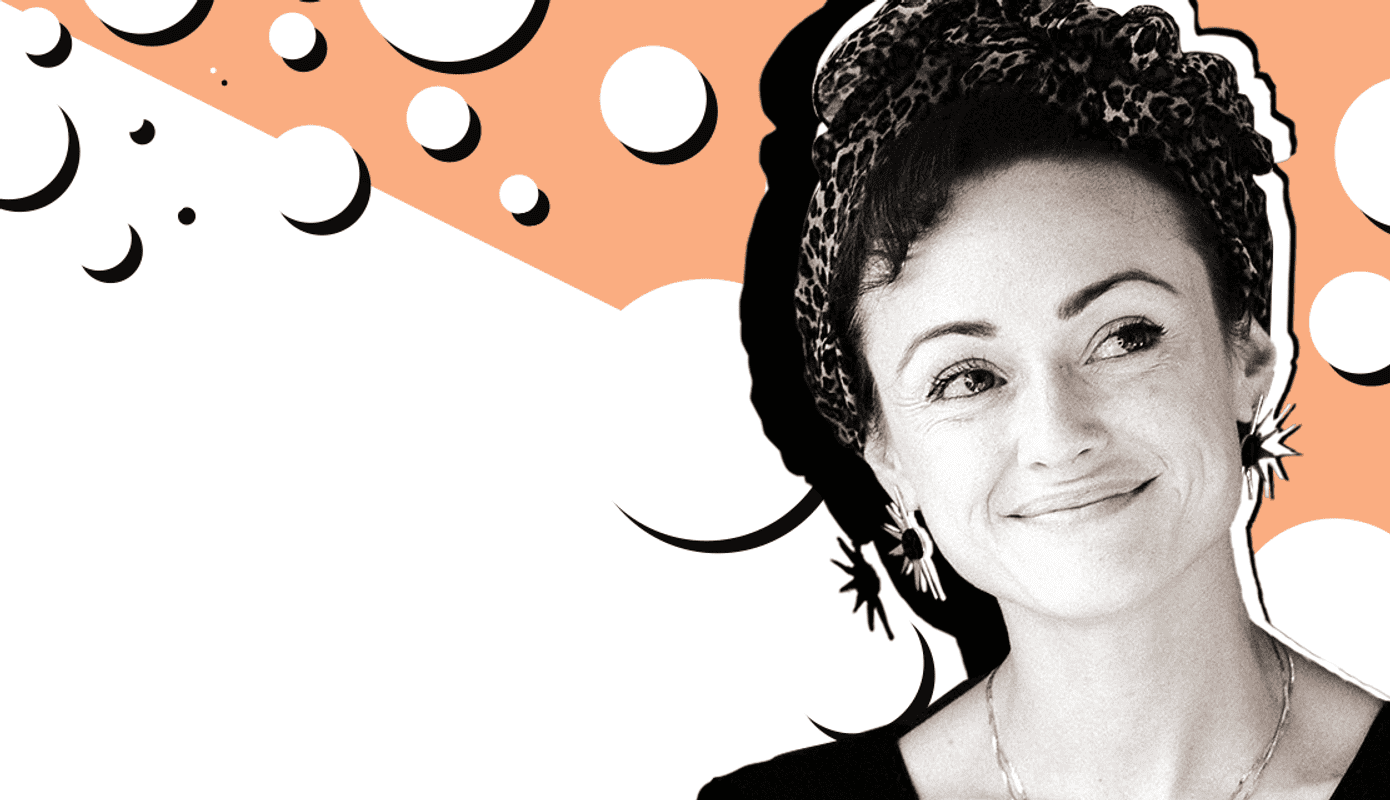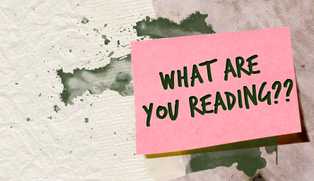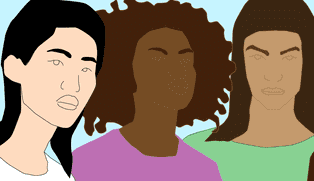We’ve been following the work of poet and playwright Sabrina Mahfouz for a little while now. In April this year she edited a book that everyone should have on their shelves: The Things I Would Tell You: British Muslim Women Write. Aside from the great title, the book weaves together plays, poems, short stories, and nonfiction pieces, on everything from a plastic surgeon who was blackmailed by MI6, to navigating Muslim Tinder. It takes us back and forth in time, travelling the length and breadth of the globe. Then in June, for one night only, Sabrina’s 2016 play about garage music (yes, you heard correctly), With a Little Bit of Luck, came to the Roundhouse. The line-up included lyrical legends DJ Luck & MC Neat and Mighty Moe of the Heartless Crew. It was pretty epic. Amongst all this, we were able to chat to her about editing The Things I Would Tell You, her most loved characters, creating worlds that you are both simultaneously inside and outside of, and how we even begin to navigate this patriarchal, Islamophobic world as Muslim women.
*
Skin Deep: How did you come to write plays? Sabrina Mahfouz: It was through poetry actually. When I was first performing poetry at open mics and stuff, I would use characters to talk about the things that I wanted to explore in a poem. Usually with multiple characters in one poem. So many people kept saying to me: Oh it’s very theatrical. You should think about writing theatre. I applied to the Royal Court Young Writers programme, and at that time they had multiple strands for different backgrounds (they don’t do that any more). The strand that I applied for was British Muslim Heritage writers under 25, where I met loads of people on that course that I would never have met usually within the theatre world, which then fed into the anthology. Not many of them have stayed in theatre, apart from Rachel De-Lahay, who’s now quite a well-known playwright. Most people went off to do other things, but a lot of us kept in touch and have continued writing in different forms. We started as a group putting plays on ourselves, because we found that there was an inclination for people to expect that a group of people from Muslim backgrounds would only want to talk about overtly political things, namely terrorism, or extremism. I think it’s slightly better now, but in 2010 there was no filter on that sort of stuff. It was like, that’s obviously what you want to talk about. But this group of writers didn’t want to talk about that, so we wrote loads of our own short plays and put them on ourselves, and that became the beginning of my theatre career. The first play I did went really well. It was really a long poem called Dry Ice – a solo piece that came from a shorter poem, which was the first poem I’d ever written. Playwriting came after poetry, but not long after. SD: Your earlier work tends to focus on women of colour in general, but your latest project, The Things I Would Tell You: British Muslim Women Write, focuses on Muslim women in particular. Was the shift in focus inspired by anything in particular, or do you see this as an organic continuation of your work? SM: I think it was a conscious decision in that the politicisation of Muslim identity has reached a crescendo point. It’s much worse now following Trump’s election, but even a couple of years ago it was really bad. One of my identities is being politicised to the maximum at this particular time – my Muslim identity. Then women within that highly politicised identity have extra layers to deal with because of the expectations and preconceived ideas that are put onto us. I wanted to try and tackle it somehow, to give a platform to question that and to try and dilute it from the very reductive image that is continuously put out. Obviously within this category of ‘Muslim women’, there is a whole range of ethnicities as well. It was a continuation of representing and platforming women of colour but taking those annoying labels and using them to try and widen the narrowness that the label necessarily incurs. It’s a weird one – you’re working with something you dislike in order to make it better. SD: It’s one of the broadest ranges of Muslim voices that we’ve heard. There’s no story that’s similar to another – emphasising this point that you make in your introduction: who is this us that we are referring to? There are threads that weave through all the different narratives, but each story is so distinct, and I wish that every single politician, or anyone who decides that they want to speak on behalf of Muslim voices, could read this book before they try and represent a whole community of people. SM: That’s fantastic – I will try and get that printed on a flyer, and get it sent to the whole of Parliament. SD: And it’s always economic value, rather than what value you’re bringing to society or to those around you. That was the narrative that was brought up around the Brexit campaigns – this idea of the ‘Good Immigrant.’ Why can’t we be bad immigrants? Why do we have to be deemed as adding monetary value to society, rather than just being? SM: Remember when David Cameron launched that scheme where Muslim women had to learn English because it was their responsibility to talk men out of being extremists? So again, it’s like the women have a moral value, and their moral value should be employed in making sure that the men stay in this moral compass. It’s completely ridiculous. Even when it comes away from economics, it’s still as ridiculous. It’s in a completely skewed way that relates purely to men, and purely to prejudice. It’s interesting that in terms of the press coverage of the book, the middle-class white commentators who have interviewed us have been really positive, helpful and supportive, but as an observation, their questions have been mainly Brexit orientated. It feels like anyone who is younger, or from a non-white background, has taken very different things from it, and they ask more about the artistic side of the book. SD: Your work has covered almost countless topics: sex, garage, immigration, love, undercover agencies. A broad overview of your work would suggest that you focus on themes relating to freedom, migration, ‘connection’ – a term that appears quite frequently in your work – and ideas of being out of place. What is it about these themes that speak to you? SM: Choosing a world, and being outside that world looking in, but also simultaneously being inside that world, looking out. You’re a storyteller within that world for both sides somehow. I guess that has to do with various things about my background and the different worlds that I’ve worked and existed in. I’m sure for a huge amount of people who have mixed heritage and various identities, they’re used to navigating one world whilst explaining that world to the next world. And vice versa. You have to choose how best to do that: what will give you the easiest ride? What will prevent you from being ostracised? But I suppose those things really do interest me – characters who are in a world not necessarily of their own choosing, but they’re there, and they’re making the most of it, trying to maintain a foot outside of that world as well. I think the sex industry is always interesting for me because it represents the different extremes of life. It’s an area where there’s so much controversy around it in terms of legislation and morality, all things people like to talk about theoretically. There is a huge variety of different jobs within the industry, and the women who work are all coming to it from different places, and doing it for different reasons. But it is still sidelined and marginalised, and has a shadow over it, so I like to try and shine a light on it, and go: let’s just talk about it. These women are just women, and if they want to say something you should listen. I don’t understand why certain things are sidelined and others aren’t. Why are you allowed to talk about it in art, but not in real life? I’m always trying to pick that apart. Women’s stories in general interest me. The first play I wrote, I actually had a male protagonist. As I was watching it I had this realisation that I’d written a male character because I thought I knew men better, because that’s what I’d read and seen represented. And when I looked at the female characters I’d written, they were so rubbish! Just laughing along to everything this guy was saying. I was like what have I done?! I know women much better, and that’s who I need to write about. It’s a decision that I made 6 or 7 years ago, and I’ve just stuck to it really. SD: Your work is featured in Audition Speeches for Black, South Asian and Middle Eastern Actors: Monologues for Women, by Simeilia Hodge-Dallaway. Why do you think it’s important to create material for black and brown actors? SM: Interestingly, for the monologue that she chose, I did say that the actor could be of any ethnicity. It’s a weird one because on one level I wanted to say, in big capital letters, that this part could be played by any ethnicity. I had got so frustrated with casting people just sending white, blonde people. So if I say ANY ETHNICITY in capital letters, that might make people realise: send me anyone you’ve got that has the spark this character needs – it doesn’t matter where they’re from. But that didn’t work out because ‘any ethnicity’ is read as the default. So I changed it up and became ridiculously specific, writing: HALF JAPANESE and HALF TUNISIAN. I thought: are directors now going to go crazy trying to find this person? I’m now out of that extreme phase, and trying to say ‘non-white.’ All my monologues are for non-white people. I hope that the imagination of those who are putting the play on will encourage them to think how many things ‘non-white’ might encompass. And I think that’s really important. People need to state that they are not looking for what is perceived as the ‘usual.’ SD: If you had to pick one character that you’ve written/created that you love, who would it be, and can you tell us about them? SM: That is such a nice question! It’s weird because I get emotional about them at different times. When I’ve just finished writing something I’ll feel like that particular character is who I’m most close to. But I guess looking back, in my poetry book from last year, there’s four fictional characters who all work in different areas of the sex industry. I feel so protective over them in a weird way, because they’re not real, but it was informed by so many years of doing women’s workshops: their voices, opinions and humour osmosised into me as I was writing their characters, which probably makes me love them the most. In terms of a personal connection, I’m most connected to With A Little Bit of Luck – my play about garage music. Garage was the most amazing part of my life. Even though the character isn’t much like I was, seeing a girl on stage at this amazing time of her life going into her 20s, hearing her tell her story, surrounded by my favourite songs, is pretty hard to beat. Seroca Davies, who plays my main character Nadia, just came in and made the character. She was Nadia – it was perfect. It’s quite an amazing thing you know, because when I started writing, the thought of getting this kind of music on stage in this form was just a complete pipe dream. The fact that it has happened is due to an amazing team, but also an openness to getting stories that are different and accessible out there.



